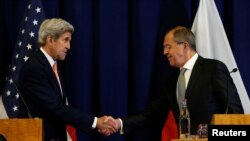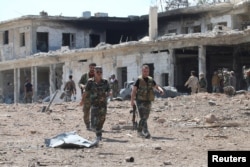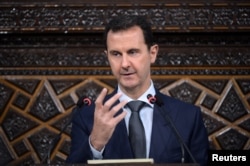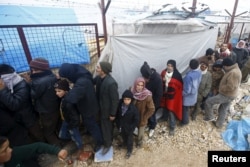The United States and Russia announced a complex, ambitious plan early Saturday in Geneva to halt five years of war in Syria, and for the two countries to cooperate on the fight against terror groups within Syria.
The deal calls on all sides to recommit to a nationwide cease-fire. Hostilities are to end by sunset September 12 — the beginning of the Muslim Eid al-Adha holiday.
"We could think of nothing more appropriate than for all the parties to come together and make Eid more meaningful to the people of Syria and the region," said U.S. Secretary of State John Kerry, standing alongside Russian Foreign Minister Sergei Lavrov.
"Working together, Russia and the United States and our teams have devised what we think is a more prescriptive and far-reaching approach," Kerry said. "If the plan is implemented in good faith ... this can be a moment where the multilateral efforts at the diplomatic table, the negotiations, can take hold, and you could really provide the people of Syria with a transition."
Halt to Syrian air campaign
The two countries agreed on steps that would prevent Syrian government forces from flying combat missions where the opposition is present and over other agreed-upon areas.
"By all accounts, the Assad air attacks have been the main driver of civilian casualties and migration flows and the most frequent violations of the hostilities," Kerry said. "Halting all of the regime's military air activities in key areas — key areas that are defined — should put an end to barrel bombs and indiscriminate bombing of civilian neighborhoods."
Kerry said this would "change the nature of the conflict."
Lavrov said he informed the Syrian government about the arrangements, and the regime of Bashar al-Assad is ready to abide by them.
U.S., Russia to fight together
The United States and Russia will also establish a "joint implementation center" to coordinate attacks on the so-called Islamic State group and Nusra.
The two countries, which have strained ties in numerous diplomatic arenas, will work for efficient cooperation to fight terrorism, expand humanitarian access and enhance cessation of hostilities in Syria, Lavrov said, while standing beside Kerry.
There were intensive intra-agency discussions in Washington between the White House and the U.S. Defense and State Departments about terms put forward by Moscow, and that delayed the conclusion of the U.S.-Russian agreement, according to diplomats from both the United States and Russia.
Viability of plan, Assad's role unclear
There is considerable skepticism that a nationwide, sustainable cease-fire — the immediate goal as it has been repeatedly characterized by State Department officials — can hold for any period of time.
Lavrov noted there are those who would like to undermine the agreement.
Syria is fractured after five years of war. There are numerous client forces of questionable allegiance and discipline pitted against each other, in addition to the so-called Islamic State group.
Russia wants to see Syria's Assad stay in power, while moderate opposition forces and Turkey insist there can be no transition deal that retains him for any period of time.
The United States has long held that the Syrian leader cannot lead any future government, due to his brutal repression of his opponents. If the just-announced plans hold, Kerry said, it could lead to political transition.
The U.N. special envoy for Syria, Staffan de Mistura, briefly joined Kerry and Lavrov at the podium. He endorsed their agreement and said he would consult with Secretary-General Ban Ki-moon before announcing a next round of Syrian peace talks.
De Mistura said he expected all parties would facilitate U.N. efforts to deliver humanitarian assistance to the populations in need, including in besieged and hard-to-reach areas.
The U.N. Security Council also would need to make a decision on any no-fly zones in Syria.
The Obama administration has repeatedly stated there can be no military solution to the prolonged Syrian crisis, which has killed hundreds of thousands of Syrians and displaced 12 million people from their home, according to U.N. estimates.
Opposition to the Assad family's four decades of rule over Syria broke into the open in early 2011, and the situation soon deteriorated into a complex civil war.
"Out of all this complexity is emerging now a simple choice between war and peace, between human agony and humanitarian relief, between the continued disintegration of an ancient society and the rebirth of a united and modern nation," Kerry told reporters.
The U.S. leads a coalition conducting airstrikes in Syria against Islamic State militants. Russia, a long-time backer of the Assad family, has also conducted airstrikes, which often target forces deemed an immediate threat to the Syrian government, some of them supported by the U.S. and its allies.
Turkey could prove an obstacle to the sustainability of a long-term cease-fire and transition deal, and it also opposes any arrangement that would allow Assad to stay in power. Turkey said its current military incursion into Syria was launched against IS, but Turkish forces also have clashed with Syrian Kurdish forces backed by the United States.
Moscow has said it is seriously concerned about the Turks' drive across the border, and its implications for Syria's sovereignty in the area.








